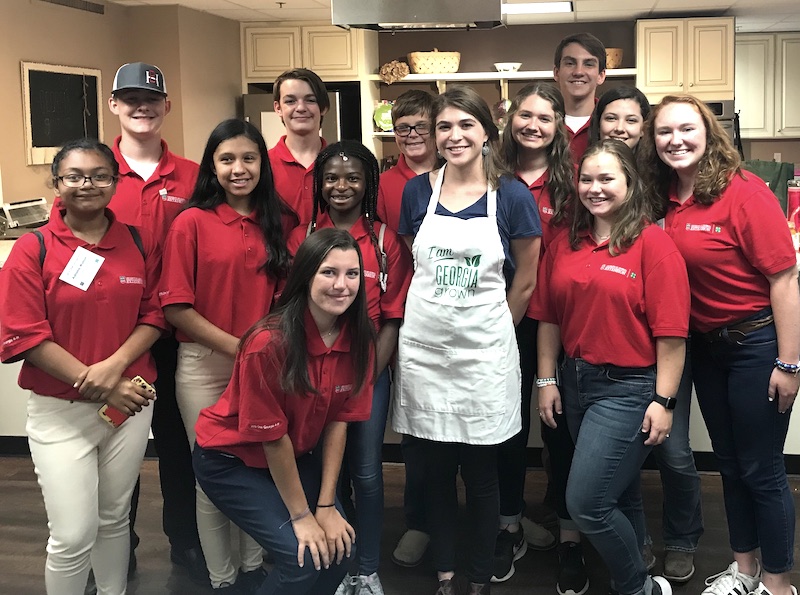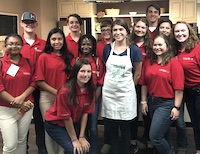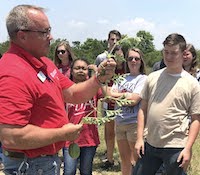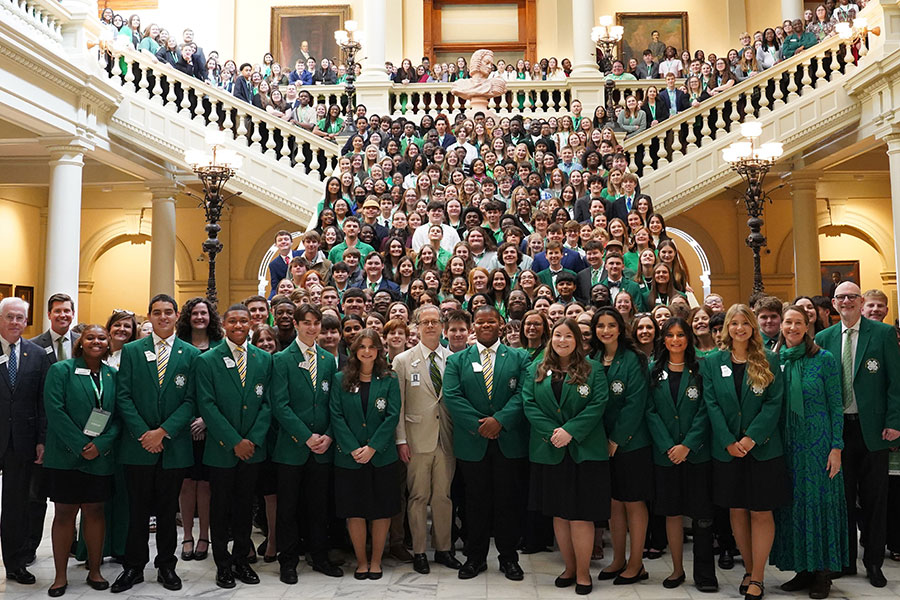Twenty-four Georgia 4-H teenagers spent their summer in a unique agriculture-focused student exchange program without leaving the state.
One Georgia 4-H, an urban-rural 4-H exchange program is designed to showcase the importance of agriculture in rural and urban areas of Georgia to students who are considering a career in agriculture, said Laurie Murrah-Hanson, a University of Georgia Cooperative Extension agent who leads a Georgia 4-H club based at the Atlanta History Center. The first-year program was funded by the Thalia and Michael C. Carlos Foundation in Fulton County.
“The program grew from the Atlanta History Center’s goal to reach new audiences in Atlanta and across the state and educate people about the similarities and differences between Georgians across the state,” said Murrah-Hanson. “We had a very diverse group of youth. Some of the students had an agriculture background and a few even live on working farms, while others live in towns and cities but are familiar with agriculture. The kids taught each other about what their lives are like where they live.”
The group first met in Tifton in June and visited sites in south Georgia. In July, they met in Atlanta and toured sites in the metro area.
In south Georgia, the students toured locations including UGA research facilities and commercial watermelon and cotton production fields. On the UGA Tifton campus, they learned about turfgrass, visited the cotton micro gin, learned hands-on laboratory skills, and toured the UGA Veterinary Diagnostic Laboratory.
Students were also able to explore the Future Farmstead, UGA’s energy-independent experimental site dedicated to developing and demonstrating advanced technologies to enhance farm efficiency with the goal of achieving future national energy, food and environmental requirements. The group also learned about the varied academic majors available in the UGA College of Agricultural and Environmental Sciences.
“They visited Super Sod, a sod farm near Perry, where they learned about sod production and saw sod harvested. That was something that none of us had seen,” Murrah-Hanson said. “We also went to Lane Southern Orchards and Dickey Farms to eat peaches and see the production line where the peaches are washed and packaged.”
The July tour in Atlanta focused on policy and transportation. The students visited the Delta Flight Museum and experienced piloting a jet in Delta’s flight simulator. At the Georgia State Capitol, Rep. Matthew Wilson, a UGA alumnus who represents the 80th District, gave the students a tour. The group also visited the Georgia Department of Agriculture, including the Georgia Grown test kitchen, and met with Mario Cambardella, director of urban agriculture for the city of Atlanta, who told them about Georgia’s urban farms.
“They learned that these farms are smaller and more diverse,” Murrah-Hanson said. “They also learned about food deserts and the new Urban Food Forest.”
The trip concluded with a visit to the Atlanta location of iconic eatery The Varsity and attending 4-H Day at the Atlanta History Center.
The One Georgia participants and their home counties include Mary Ann Bentley, Chattooga County; Jake Carver, Houston County; Madison Clemente, Paulding County; Kaylee Collins, Spalding County; Avery Cross, Catoosa County; Maddie Dean, Crisp County; Jada Faulks, Cobb County; Alyssa Goldman, Madison County; Gracie Grimes, Candler County; Megan Isdell, Worth County; Christopher Kuhbander, Ware County; Grace McBride, Emanuel County; Hannah McElrath, Gordon County; Michael Mercer, Cobb County; Brooke O’Berry, Ware County; Emily Recinos, Cobb County; Aromal Saji, Gwinnett County; Autumn Sims, Murray County; Kolbi Sims, Murray County; Bryson Smith, Gordon County; Cora Jane Tyre, Bacon County; Adriana Walton, Randolph County; Emma Rae Ward, Chattooga County; and Kate Vaughn, Bulloch County.
“This was my favorite 4-H trip so far,” said Emma Rae Ward. “I’m from an ag community and I live on a farm, but it was very refreshing to see what agriculture looks like in Atlanta and to see some of the things that I see at home in north Georgia — we just have fewer gnats.”
Gracie Grimes lives on a farm but says she never knew Atlanta “had so much to do with agriculture.”
“This experience has truly been one of my best and I made a lot of new friends,” she said. “My favorite part was visiting the capitol and the Georgia Department of Agriculture. The sod farm was new for me and the watermelon farm was cool, as we used to grow watermelons on our farm.”
Following the exchange experience, students are required to share their experience with groups in their community such as county commissions, boards of education, school administrations and community or civic groups, as well as with their peers at Georgia 4-H’s Fall Forum.
Georgia 4-H hopes to secure funding to offer the program again next summer, Murrah-Hanson said.
To learn more about Georgia 4-H, visit www.Georgia4H.org.









